Main CPGW Record
Surname: LOCKER
Forename(s): Bernard
Place of Birth: Silsden, Yorkshire
Service No: 34252
Rank: Private
Regiment / Corps / Service: East Yorkshire Regiment
Battalion / Unit: 7th (Service) Battalion
Division: 17th (Northern) Division
Age: 19
Date of Death: 1916-11-07
Awards: ---
CWGC Grave / Memorial Reference: Pier and Face 2 C.
CWGC Cemetery: ---
CWGC Memorial: THIEPVAL MEMORIAL
Non-CWGC Burial: ---
Local War Memorial: SILSDEN, YORKSHIRE
Additional Information:
Bernard Locker (born 18 March 1897) was the son of Herbert and Mary Locker, née Bairstow. Herbert was born at Lincoln, Lincolnshire and Mary at Wilsden, Yorkshire.
1901 Silsden, Yorkshire Census: 7, Hawthorne Street - Bernard Locker, aged 4 years, born Wilsden [sic], Yorkshire, son of Herbert and Mary Locker.
1911 Silsden, Yorkshire Census: 27, Elliott Street - Bernard Locker, aged 14 years, born Silsden, son of Herbert and Mary Locker.
The British Army Service Record for Bernard Locker exists but may be incomplete.
British Army WW1 Medal Rolls Index Cards: Pte Bernard Locker, 34252, E. York. R.
British Army WW1 Medal and Award Rolls: Pte Bernard Locker, 34252, 7th E. York. R. Regarded Dead.
Army Registers of Soldiers' Effects: Pte Bernard Locker, 34252, 7th Bn E. Yorks. Date and Place of Death: On or since 7.11.16. Death pres'd. To whom Authorised/Amount Authorised: Father - Herbert. £10 0s. 3d.
UK, WW1 Pension Ledgers and Index Cards, 1914-1923: Pte Bernard Locker, 34252, 7th East Yorks. Date and cause of death: 7.11.16. Reported missing. Dependant: Mrs. Mary Locker. Relationship: Mother. Address: 27, Elliott St. Silsden, Keighley. Pension: 7/6 [£0 7s. 6d.] a week from 10.7.17. Date awarded: 19.7.17.
Data Source: Craven’s Part in the Great War - original CPGW book entry
View Entry in CPGW BookEntry in West Yorkshire Pioneer Illustrated War Record:
SILSDEN
LOCKER, Bernard, aged 19, East Yorkshire Regiment, 27, Elliot Street, reported missing Nov. 17, 1916, now presumed dead.
---
Click the thumbnail below to view a larger image.
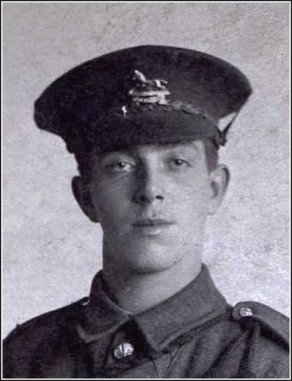
Private Bernard LOCKER
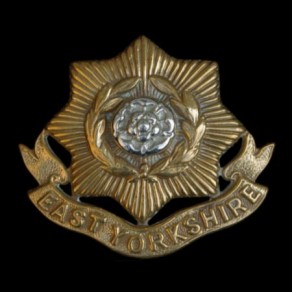
Regiment / Corps / Service Badge: East Yorkshire Regiment

Divisional Sign / Service Insignia: 17th (Northern) Division
Data from Soldiers Died in the Great War 1914 - 1919 Records
Soldiers Died Data for Soldier Records
Surname: LOCKER
Forename(s): Bernard
Born: Keighley, Yorks
Residence:
Enlisted: Bradford
Number: 34252
Rank: Private
Regiment: East Yorkshire Regiment
Battalion: 7th Battalion
Decorations:
Died Date: 07/11/16
Died How: Killed in action
Theatre of War: France & Flanders
Notes: Formerly 1525, W. Yorks Regt.
Data from Commonwealth War Graves Commission Records
CWGC Data for Soldier Records
Surname: LOCKER
Forename(s): Bernard
Country of Service: United Kingdom
Service Number: 34252
Rank: Private
Regiment: East Yorkshire Regiment
Unit: 7th Bn.
Age: 19
Awards:
Died Date: 07/11/1916
Additional Information: Son of Herbert and Mary Locker, of 1, Laurel Grove, Silsden, Keighley, Yorks.
View Additional Text
View Additional Text For Soldier Records
BRITISH BATTALIONS ON THE SOMME, by Ray Westlake (Pen & Sword Books Limited 1994)
7th (Service) Bn. East Yorkshire Regiment
Unsuccessful attack on Orion Trench (5/11). Casualties – 193. Relieved (6/11).
[Bernard Locker, according to C.W.G.C. and Soldiers Died, was killed in action on the 7th November 1916; but he may have died in the attack on Orion Trench on the 5 November 1916.]
THE EAST YORKSHIRE REGIMENT IN THE GREAT WAR 1914-1918, by Everard Wyrall
On the 27th [October, 1916] the 7th East Yorkshires marched to Mametz, where until 2nd November a wretched period was spent in tents. The 50th Brigade had taken over trenches in the Lesbœufs sector on the 29th October, and on the 2 November the 7th East Yorkshires relieved the 10th West Yorkshires in the front line. The battalion now had a strength of 16 officers and 560 other ranks. Next morning, at 6.15 a.m., the C.O., Lieut.-Colonel P.A. Clive, when visiting the front line was wounded in the thigh and arm. Command of the battalion was then taken over by Major G. East-King.
The sector of the line now held by the 7th East Yorkshires, and the 50th Brigade generally, was in a terrible condition. The outgoing battalions had been in a state of utter exhaustion. Mud in the front line was hip deep. Men sank in the filthy morass and, in places, could not be got out for 24 hours. It was a pestilential spot.
The 50th Brigade on 2nd November held the front, with the 7th East Yorkshires on the right and the 7th Green Howards on the left. About 4 p.m. four waves of German infantry attacked the 7th Lincoln Regiment (51st Brigade), on the left of the Green Howards. The enemy’s first wave managed to penetrate the front line, but the three other waves were annihilated, largely owing to the flanking fire of the Green Howards and East Yorkshires. A counter-attack completely restored the situation, 40 Germans being captured.
On the 5th November ‘battle patrols’ of 40 officers and men from the Green Howards, and 60 to 70 officers and men from the East Yorkshire Regiment, were ordered to attack the enemy. The latter were to attack and occupy Orion (an enemy post) and the gunpits near it. On the right and left of the 50th Brigade attacks on a large scale were to take place.
At 11.10 a.m. the attack began and the Germans immediately began to run from their trenches; but, seeing how small the attacking parties were, they halted and opened fire. All the officers of the attacking troops were shot down and the attack failed. In this affair the 7th East Yorkshires lost 2nd Lieutenant F.W. Drew killed, 5 officers wounded and 1 officer missing. In other ranks the losses were 18 killed, 84 wounded and 84 missing.
After a fortnight of concentrated misery, the 50th Brigade was relieved by the 1st (Guards) Brigade on 13th November, and returned to the Molliens-Vidame area, the 7th East Yorkshires moving to Montagne. Here ordered quiet and routine, with good food and recreation, rapidly improved the condition of the troops, but that first terrible period in the line in the Lesboeufs sector was long remembered.
[Private Bernard Locker was killed in action on the 7th November]
View Additional Image(s)
Additional Photo(s) For Soldier Records
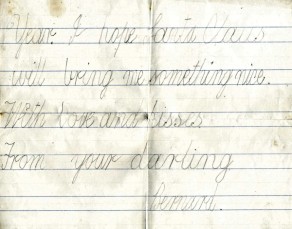
Front cover of a folded paper Christmas card written by Bernard Locker when he attended Silsden Infant’s School
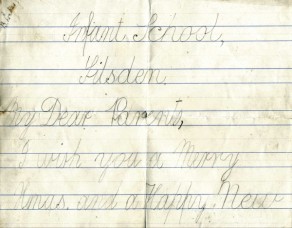
Inside page of the folded paper Christmas card written by Bernard Locker when he attended Silsden Infant’s School.
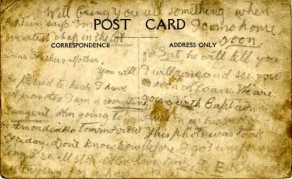
Message on back of the previous image
Dear Father and Mother, You will be pleased to hear I have got promoted I am a recruiting sergeant. Am going to Heckmondwike tomorrow Friday. Don’t know how long I shall stop. Alec is trying for a pass for Sat. he will tell you I will come and see you as soon as I can. We are going with Captain Burton in his motor. This photo was took before I got uniform. Love to S, I and E Bernard x x x x x [The following is written at the top of the message] Will bring you all something when I come home soon. The Captain say’s I’m smartest chap in the lot.
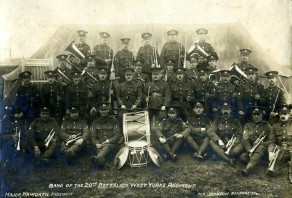
Band of the 20th (Reserve) Bn. Prince of Wales’s Own (West Yorkshire Regiment)
Private Bernard Locker, 3rd row from front, far right
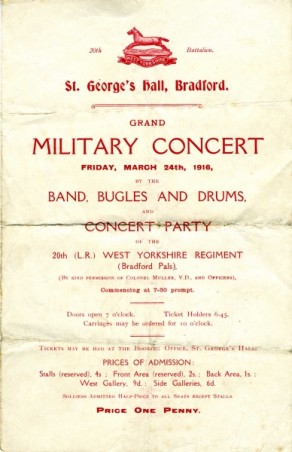
Front cover of Military Concert programme, dated 24 March 1916
Front cover of Military Concert programme, dated 24 March 1916. Bernard Locker was at the time a member of the band of the 20th (Reserve) Bn. Prince of Wales’s Own (West Yorkshire Regiment)
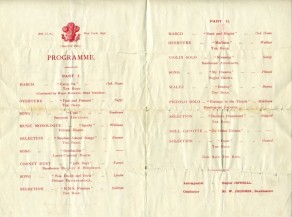
Inside pages of the Military Concert programme, dated 24 March 1916
Inside pages of the Military Concert programme, dated 24 March 1916. Bernard Locker was at the time a member of the band of the 20th (Reserve) Bn. Prince of Wales’s Own (West Yorkshire Regiment)
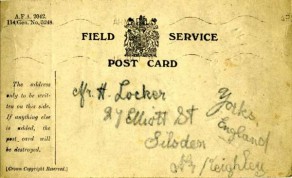
Field Service Post Card
Field Service Post Card sent home from Private Bernard Locker, dated 14 October 1916
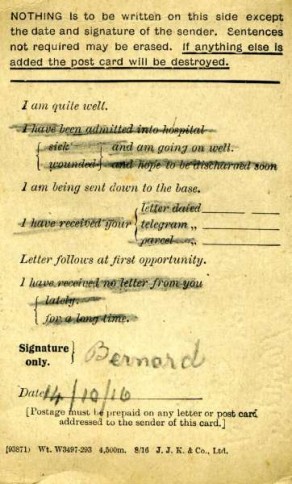
Field Service Post Card
Field Service Post Card sent home from Private Bernard Locker, dated 14 October 1916
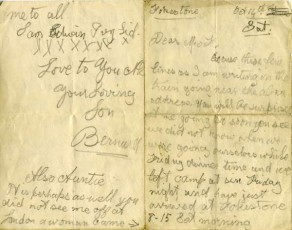
First and last pages of a letter from Private Bernard Locker to his mother and father, dated, 14 October 1916
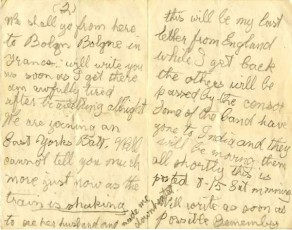
Second and third pages of a letter from Private Bernard Locker to his mother and father, dated, 14 October 1916
![Page 1 of a letter from Private Bernard Locker to his mother and father, dated, 16 [17th?] October 1916](https://cpgw.org.uk/wp-content/uploads/193-02_28-292x334.jpg)
Page 1 of a letter from Private Bernard Locker to his mother and father, dated, 16 [17th?] October 1916
![Page 2 of a letter from Private Bernard Locker to his mother and father, dated, 16 [17th?] October 1916](https://cpgw.org.uk/wp-content/uploads/193-02_29-292x336.jpg)
Page 2 of a letter from Private Bernard Locker to his mother and father, dated, 16 [17th?] October 1916
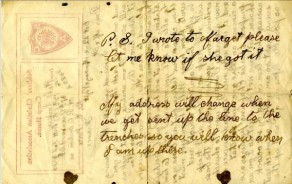
Written on the back of page 1 of a letter from Private Bernard Locker to his mother and father, dated, 22 October 1916
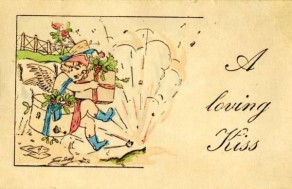
Message card contained within the postcard sent from Private Bernard Locker to his sister Ivy, dated 26 October 1916
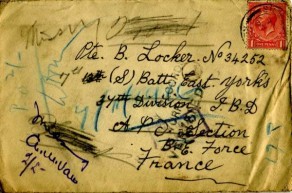
Envelope of a returned letter sent to Private Bernard Locker from his father, dated, 27 October 1916
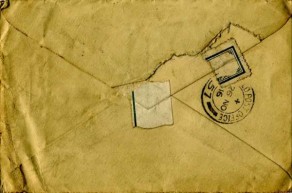
Back of envelope of a returned letter sent to Private Bernard Locker from his father, dated, 27 October 1916
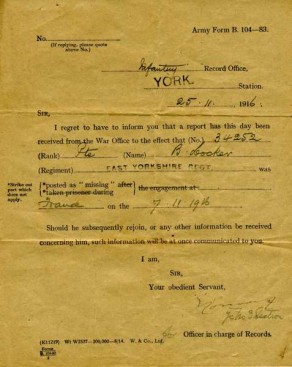
Official Army Records Form sent to the next-of-kin of Private Bernard Locker, dated, 25 November 1916
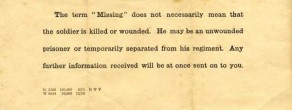
Information included with the Official Army Records Form sent to the next-of-kin of Private Bernard Locker, dated, 25 November 1916
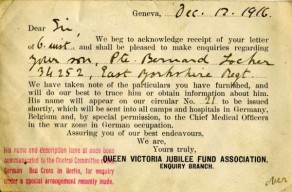
Reply Card sent from Queen Victoria Jubilee Fund Association, Enquiry Branch, dated, 17 December 1916
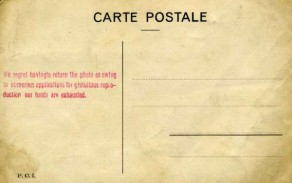
Reverse of Reply Card sent from Queen Victoria Jubilee Fund Association, Enquiry Branch, dated, 17 December 1916
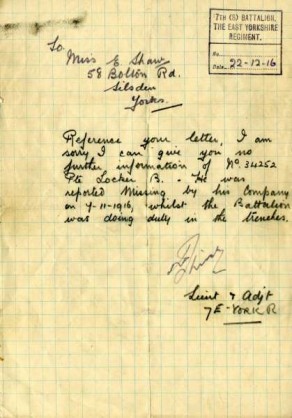
Letter replying to a request from his battalion for information about Private Bernard Locker, dated, 22 December 1916
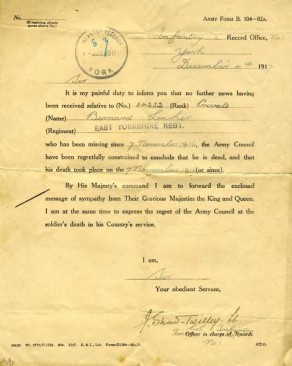
Official Army Records Form sent to the next-of-kin of Private Bernard Locker, dated, 4 December 1917
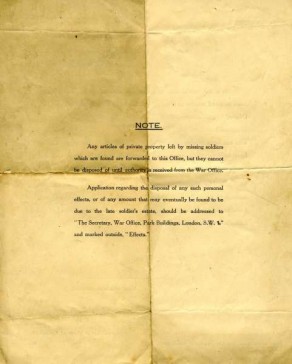
Reverse side of Official Army Records Form sent to the next-of-kin of Private Bernard Locker, dated, 4 December 1917
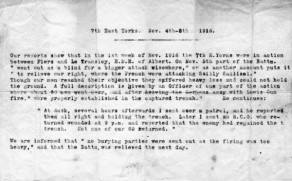
Details included with a letter from the British Red Cross and Order of St. John
Details included with a letter that was received by the parents of Bernard Locker, on the 14 January 1918, from the British Red Cross and Order of St. John. (See West Yorkshire Pioneer for the 18 January 1918.)
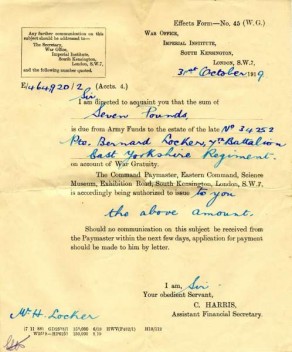
Official Army Records Form sent to the next-of-kin of Private Bernard Locker, dated, 31 October 1919
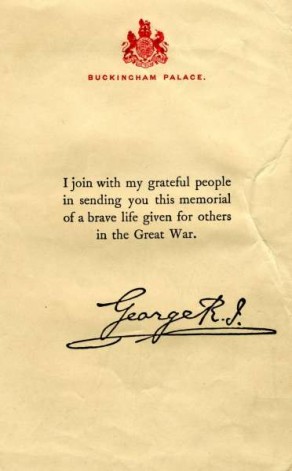
Bestowal document with King's message accompanying the next of kin Memorial Plaque for Private Bernard Locker
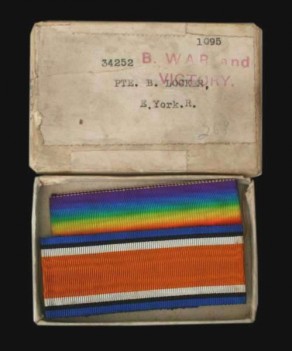
Medal ribbons
Box containing the medal ribbons sent to the next-of-kin of Private Bernard Locker [Top - Victory Medal, bottom - British War Medal]
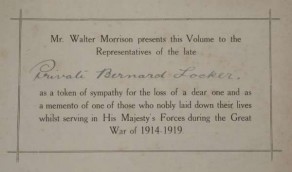
Front piece from Private Bernard Locker’s volume of Craven’s Part in the Great War that was presented to his parents
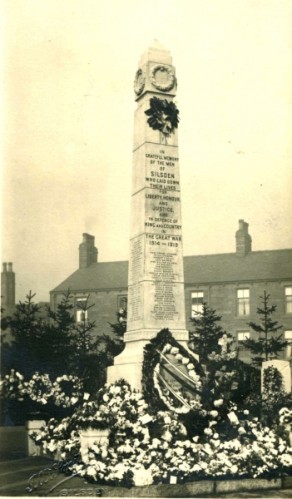
Silsden War Memorial
Photograph of Silsden War Memorial that belonged to the parents of Bernard Locker
View Craven Herald Articles
View Craven Herald Articles

12 November 1915
Silsden Roll of Honour
The total number of enlistments from Silsden is now 221. Three more names have been added during the week: Ottiwell Lodge, Alex Atkinson and Bernard Locker, the latter two having been omitted from previous lists.
01 December 1916
FURTHER SILSDEN CASUALTIES
Pte. Bernard Locker, of the Yorkshire Regt., and son of Mr. and Mrs. Herbert Locker, of 27, Elliott Street, Silsden, is officially reported as missing since the 7th of November. Pte. Locker enlisted two years ago in the West Yorkshire Regiment and was for a considerable time a member of the band attached to that regiment. He was 19 years of age. He had been formerly connected with the Silsden Primitive Methodist Church and Sunday School for over ten years, and was also a member of the Silsden Brass Band. Prior to enlisting, he was employed at Messrs. John Dixon & Sons, bobbin manufacturers, Steeton. He had only been out in France about six weeks.
29 December 1916
SILSDEN’S FOUR FALLEN HEROES – VICAR’S INSPIRING SERMON
On Sunday morning a service was held at the Silsden Parish Church in memory of four Silsden soldiers who have made the supreme sacrifice for King and Country:–
Sergeant Rowland Hill, of the Duke of Wellington’s West Riding Regiment;
Corporal Fred Taylor, of the same regiment;
Gunner Wm. Hartley Sutcliffe, of the Royal Field Artillery; and
Pte. Dan Faulkner, of the Royal Irish Rifles.
There was a large congregation, including a number of the deceased soldiers’ relatives, and a number of local soldiers home on leave. The officiating clergyman was the Rev. E. E. Peters, M.A. (vicar).
In the course of his sermon Mr. Peters said that we as a nation, by reason of our great prosperity, and by reason of the sea surrounding us, had had for a long time very little sacrifices to make. So little had the sacrifices been that we were losing sight of the great principles of true religion. But in August, 1914, we had to make a great decision; we had to decide whether we should accept the way of the Cross, which was the way of sacrifices; whether we should show ourselves willing to be disciples of Jesus Christ, lovers of truth, righteousness and justice; or whether we should deny ourselves to be unworthy of the great place which God had given us in the world. By the grace of God we chose the way of the Cross, and because we chose that way, not in blindness, and not without a thorough realisation on the part of all thinking people at least of the terrible sacrifices entailed, because of that we had suffered many great sacrifices. We had had to make the most awful sacrifices which we as a country had ever made, and we were learning more and more the lesson that as Christ suffered so also must we suffer. They, as a community in the village of Silsden, had shared the sufferings of their kin. They had met before in that place of worship to hold services of a similar character to that they were holding that morning, and once more they were met together to the honour and glory of God and to the blessed memory of four gallant men who had accepted the law of Christ, and who had made the supreme sacrifice in giving their lives for the sake of their country.
HEAVY BLOW TO THE CHURCH
The death of Sergeant Rowland Hill had been a particularly heavy blow to the Church in Silsden. As they all knew he was the son of one of the most devoted Churchmen, and one of the most public-spirited men who lived amongst them. Sergt. Hill showed every promise of walking in the footsteps of his respected father. There were present that morning a company of Boy Scouts, and they knew well what Sergt. Hill was as one of their Scoutmasters. The Scouts remembered, and never would forget, because they had told him (Mr. Peters) so often, how during his vacation as a student at the Bradford Technical College, he formed one of a party at the beginning of the war to guard the waterworks in that neighbourhood. That they would always remember, and he hoped by the will of God they would be influenced by his example, they could well understand that a boy such as he would feel it was his duty to enlist in the armed forces of His Majesty to defend his country, and to do his part in the great battle for righteousness, truth and justice. They all knew in what love he was held by his family. He was an only son in whom great hopes were centred, and yet when he asked his father for permission to enlist the latter put no difficulty whatsoever in his way. He spoke to him as so many hundreds and thousands of fathers had done, and pointed out to him what he knew the war would be, but gave him his permission at once, although under age, to become a soldier. They knew him well in Silsden; his manners were gentle and kindly yet, like so very many more of our race, he had no natural disposition for warfare, although he made a splendid soldier. They had heard much of him from his officers and from his comrades, and they were all in agreement in saying that he was brave, without any fear, that he was capable and reliable, that he was considerate to those under him, and that above all he was ever cheerful. He soon rose to the rank of a non-commissioned officer, and they had been told over and over again that he was one of the best sergeants in the Battalion, and very soon he would have received the honour of a commission. However, that bright most promising and lovely life that he had shown was cut short so far as this world was concerned by a German shell. The information concerning his death came as a great shock to them at Silsden, and the deepest sympathy was felt by all for the bereaved family.
A PATRIOTIC FAMILY
Another young man whose memory they celebrated that morning, a young man of promise and character, was Corporal Fred Taylor of the same Battalion. He had heard much good of him too, but as they all knew a memorial service had been held for him in one of the other places of worship in that town, and he could not add anything to what had already been said at that service, except to express their deep sympathy with his friends and relatives.
The other two men, Gunner Wm. Hartley Sutcliffe and Pte. Dan Faulkner, were, like Rowland Hill, two men who as boys had been brought up in their Sunday School. They were fine young fellows who had early answered the country’s call. They all knew that Private Faulkner was the brother of Private Jobey Faulkner, in whose memory a service was held a short time ago. He had given his life also for his Country. He was a member of a very patriotic family who had two more brothers still serving at the Front. They owed their deepest gratitude to those men for what they had done for them, and their most heartfelt sympathy went out to the sorrowing families.
He was sure that when they thought of them they thought of two more families in Silsden who were in critical anxiety and suspense yearning for news of the whereabouts of their sons, which was perhaps in some ways worse than knowing their fate: the families of Pte. Garnett Longbottom and Pte. Bernard Locker, both of whom had been reported as missing. They only hoped and prayed that those families might have good news before very long.
They owed a debt of gratitude to those men, and how should they show that gratitude? Could they show it to the men themselves? They were in a very slight way showing some appreciation of what those men had done by gathering there that morning. But they hoped when the war was over to erect a permanent memorial to be handed on to their successors, to be an inspiration to them, of all those who had fallen in the war. But they could show their sympathy to the families of those men as they had done and were doing by consideration to them in every way that was possible. Another way, and perhaps the most important way of all to show their gratitude and honour for those men, was that all the forces available to us should be used to prosecute this war to a successful issue. We had heard of rumours of peace during the past week or so, and we knew perfectly well that if we made a peace which was not a real peace but just a truce to enable our enemies to strengthen their resources, it would be an act of the most cruel treachery and a betrayal of those gallant men who had died in order that our ancient liberties might be observed. There was one thought suggested to them, and probably he had suggested it before. Whenever they though of those bright, happy and splendid fellows who had gone from their midst the question came to them, “Am I worth that sacrifice?” It was a terrible and solemn question. It might be that there were some present who had asked themselves that question and had felt that they were not worthy of it. He hoped they all felt that. They all ought to feel their unworthiness, and it was very questionable whether they were individually worth it or not. It was their duty and their privilege to do as far as possible what they could to make themselves worthy of the great sacrifices that had been made for them.
How could they make themselves worthy? By being good citizens, and showing that in every way we could we would carry the burden of responsibility of membership of a great Empire to which we belonged. To most of them the burden was a very light one compared with the burden that those men carried unto death. How could we best bear that burden and do our share in the great task set before us? There was only one way and that by being followers not only in name, but also in deed and in truth, of Him who died for us and for our salvation – Jesus Christ our Lord and Saviour whose birthday would be celebrated the following day. May God give them grace to learn the lessons he would have them learn amid all the sorrow and anguish of this terrible war.
Special prayers were offered, and during the service the hymns ‘O God of love, O King of peace’, ‘On the resurrection morn’, and ‘O God our help in ages past’ were sung. Appropriate music was also played by the organist (Mr. Herbert Cooper, A.R.C.M.).
30 March 1917
SILSDEN – SOLDIER MISSING SINCE NOVEMBER LAST
Pte. Bernard Locker of the East Yorkshire Regiment, and son of Mr. and Mrs. Herbert Locker, of 27, Elliott Street, Silsden, has been missing since November 7th of last year. Locker, who is 19 years of age, joined the Bradford ‘Pals’ about two years ago and was in the band connected with that Regiment. In October last he was sent to France, and on arriving there he was transferred into the East Yorkshire Regiment. He had only been at the Front about three weeks when official information was received that he was missing after doing trench duty.
His parents and officials of the Silsden Primitive Methodist Sunday School, of which Pte. Locker was a regular attender prior to joining the Colours, have made numerous efforts to gain information concerning his fate, but up to the present without avail. Since the official information was received stating that he was missing there has been no communication to hand of any kind except replies to letters which have been sent to various centres from whence investigation of the whereabouts of prisoners is carried out. Mr. and Mrs. Locker are anxious to learn their son’s fate, and would be glad of any information which might help to throw light on the matter.
27 July 1917
SILSDEN – IN MEMORY OF THE BRAVE
The Rev. J. E. Woodfield, of Farnhill, conducted a special service at the Silsden Primitive Methodist Church on Sunday morning last in memory of Bernard Locker, missing, now reported killed, Wilfred Clarkson, of the Vanguard, and Charles H. Gill, killed in action, all of whom were formerly associated with the above Church and Sunday School.
Mr. Woodfield remarked that there were doubtless many remarks that might be made in reference to the deceased young men, but he would refrain from opening up the great wound. He knew that on behalf of that Church and congregation, Sunday School and town, they tendered their most heartfelt sympathy to the sorrowing relatives, and prayed that they might be definitely sustained and comforted. Reference was also made to persons connected with the Primitive Methodist Church who had died since the last memorial service, namely Sam Fort, Edwin Kirkham, John Tillotson, George Horn, Clement Crane, and Ann Mawson. During the service the organist played ‘O rest in the Lord’ and the Dead March in ‘Saul’.
On Sunday evening the Rev. Robertson Ballard (Wesleyan minister) occupied the pulpit and preached a sermon from the words, “Why does God not stop the war?” During the service, Miss Elsie Clarkson, contralto, contributed the solo, ‘The Better Land’.
18 January 1918
LOCKER – Death presumed of Private Bernard Locker, East Yorks. Regiment, son of Mr. and Mrs. Locker, 27, Elliott Street, Silsden, missing since November 17th, 1916, aged 19 years.
18 January 1918
SILSDEN – PRIVATE BERNARD LOCKER PRESUMED KILLED
Private Bernard Locker, of the East Yorkshire Regiment, son of Mr. and Mrs. Herbert Locker, 27, Elliott Street, Silsden, has been reported missing since November 17th 1916. Private Locker, who was 19 years of age, joined the Bradford Pals in June 1915, and was attached to the regimental band. He was sent to France in October 1916, when he was transferred to the East Yorkshire Regiment. He had only been at the Front about eight days when official information was received to the effect that he was missing. The parents and officials of the Silsden Primitive Methodist Church, of which Private Locker was a regular attender prior to enlisting, have made numerous efforts to gain information concerning his whereabouts or what happened to him. Since receiving the official news stating that he was missing there has been no communication to hand of any kind, except replies to letters, until Monday last, when a letter was received from the British Red Cross and Order of St. John stating “notwithstanding constant and careful inquiries, we have not been able to hear anything of your son, and have had to come to the conclusion that he must have lost his life at the same time when he was posted missing. We have questioned all the men of his unit whom we have been able to see, both in English hospitals and at the bases abroad, and none of them has been able to throw any light on his casualty. We have, however, been able to collect some details about the action, and we enclose a copy of this, fearing that in spite of all our efforts we shall not be able to help you further in the matter. We do indeed watch all the prisoner’s lists as they come in from Germany, but we cannot hope to find there any names of men missing so long ago. We wish to offer our sincere sympathy to the family and friends.”
Private Locker was formerly a member of the Silsden Brass Band, and was employed at the Steeton Bobbin Mill.
View West Yorkshire Pioneer Articles
View West Yorkshire Pioneer Articles

01 December 1916
SILSDEN CASUALTIES
Pte. Bernard Locker, of the Yorkshire Regiment, son of Mr. and Mrs. Herbert Locker, of 27, Elliott Street, Silsden, is officially reported as missing since November 7th. Pte. Locker enlisted about two years ago in the 20th West Yorkshire Regiment, and was for a considerable time a member of the band attached to that regiment. He was 19 years of age. He had been formerly connected with the Silsden Primitive Methodist Church and Sunday School for over ten years, and was also a member of the Silsden Brass Band. Prior to enlisting Pte. Locker was employed at Messrs. John Dixon and Sons, bobbin manufacturers, Steeton. He had only been out in France six weeks.
05 January 1917
INTERCESSION AND MEMORIAL SERVICE AT SILSDEN – Impressive Sermon by Rev. W. Dickinson
An intercession and memorial service for the fallen heroes in the war was held at the Silsden Primitive Methodist Church on Sunday evening last. There was a large congregation, and the officiating minister was Rev. Wm. Dickinson (pastor). During the service the hymns 'O God our help in ages past,’ ‘Lord God of hosts, Whose Almighty hand,’ ‘God the all terrible! King Who ordainest,’ and ‘When wilt Thou save the people’ were sung. Miss Clara Fortune also ably sang the solo ‘O rest in the Lord,’ and at the close of the service the organist (Mr. Bernard Longbottom) played the ‘Dead march’ in ‘Saul,’ and the National Anthem was sung.
WAR A HARMFUL THING
Preaching from the text Psalm 46, 9th verse, ‘He maketh wars to cease unto the ends of the earth,’ Mr. Dickinson said it seemed almost superfluous to say in this sad day in which we lived that war was a serious and harmful thing. It was, however, a great outstanding fact. When they looked at the expense even in times of peace, when nations made preparations for war, it was even then a great expense, but in days of actual warfare as to-day, when the nation was spending at least £5,000,000 a day, then it was that they were reminded that war was a serious thing from a financial point of view. They tried to have dreams or visions as to what would have been done with that money for philanthropic purposes and for the social amelioration of the people of this country, but the country had put those dreams or visions in the back ground. Then we had the cruelty of it, and the passions that it excited. It marched to hunger and thirst and wounds and death. Then we had the bereavements. Children were made orphans, women were made widows, and parents mourned over children and many were left childless. Then we also had the deplorable feelings produced by war, feeling of revenge, feelings that produced quarrelsomeness, a desire for power and an unholy lust of ambition. That was seen by the works of the great Napoleon, and also by the Kaiser and the Prussian War Lords. The question that now forced itself to the front was ‘Is all war morally wrong?’ We had a very high ideal, and we believed that war was all wrong. They read in the Old Book that David was not allowed to build the temple of the Lord because his hands had been stained by blood, and he was spoken of as a man of war. But, in these days we had to look at actual facts. What was the actual state today? When one side would prepare for war and was determined to declare war, what then could we do? That great poet in Russia called Tolstoy preached the doctrine of being passive, but when we came to think of it, could we be passive? If our homes were to be destroyed and our wives and children to be taken from us, could we be passive? Did it not arouse within us that spirit of manhood that we must assert ourselves and that we must fight? If we were not prepared to do that, all he could think was that we were cowards. They ought to bury their heads and be ashamed of themselves. In days of peace with one breath they would denounce all war, and yet in the very next breath they would ask the question why the Congo atrocities were not stopped even if force were necessary. To-day they looked upon a devastated Serbia, Montenegro, Belgium, and alas Roumania, and they came to the conclusion that there were worse things than war – Armenia and the Congo, and the slavery of the South Americans; and what would have been the slavery of Europe had it not been for the call to arms in a cause that was just and righteous?
A JUST AND RIGHTEOUS CAUSE
If it were not for that conviction that the cause for which they were at war was just and righteous, many of them would have failed to preach, to pray, or to look to God. But, it was that which gave them strength that they looked to him Who was the present help and refuge in their trouble. In their fight against war whom should they attack? Often in the past the attack was made upon the soldier. They could not do that to-day as far as this country war concerned. They had a great civilian army, and they were fighting for freedom, for righteousness, and for justice. They never wanted to be soldiers, they never wanted to fight, but the call had come and they could do no other. Who made war, and why should there be war? Not the soldier. In the days that were gone, it was more the civilian than the soldier, the civilian because he was represented by his Parliament and that Parliament as the representative of the civilian often made war, because the lust for power and the lust for gold had got hold of them. Then in the commercial world, amongst what was known as the ruling classes, there was generally speaking a disposition to make war because there was the old saying that trade followed the flag. The soldier fought because he was ordered to do. It was neither Roberts, Kitchener, nor Buller who made the Boer War. If anybody made it, it was Kruger, Milner, and Chamberlain, and it was made because they had greed for power, and an unholy ambition and wish for gold. If they went back through the pages of history, they would find that that was the source of war as far as this country was concerned. He had come to the conclusion that the man who shouted for war had an axe to grind. The man who shouted for war ought to be made to go and face the music and not to send others. What did soldiery stand for? Generally speaking it stood for the aggressive, the quarrelsome, the brute force. They could not say that of the civilian army that had been raised by this country. They were not aggressive, they were not quarrelsome, and neither could they say that they were asserting brute force. He was sorry to have to say it of the Central Powers where conscription had been reigning for so many years. It was the brute force and the aggressive power that they would have to abolish. But when they had said that, they were bound to come to the conclusion that
SOLDIERY HAS ITS GOOD POINTS
The soldier side by side with the doctor stood to give his life for his country and that was a great deal. He would advise anyone to pause before he sneered at a soldier. He stood between them and the enemy, and if it had not been for the brave men who had stood thus, where would they have been to-day? They had no words too high in their commendation and admiration and love for the civilians of this Empire, who had stood between them and the enemy in this time of crisis. The question came to each one of them what was their position and what were they doing in the national crisis that was before them, and still after all they came to the conclusion that the soldier's life as they saw it to-day was a regrettable necessity, that all those brave men should have to shoulder the musket and defend our shores and fight for the freedom, righteousness, and justice of a cause that none of them disputed. They regretted in this the 20th century that such a thing should have happened. It ought not to have come to pass, and it never would have come to pass if the great Central Powers of Europe had taken heed of the sayings of Christ, and had seen His crucified hands instead of the mailed fist, and if they had listened to His beatitudes instead of the philosophy of the German teachers. How were they to lessen those evils? They must attack the root, that lust for power, that quarrelsome spirit, and that unholy ambition that had dominated the great Central Powers. How were they to attack the root? By educating the people for peace at the proper time, and that perhaps was not just yet. It was an easy matter to give descriptions of the horrors of war, to speak of its abominations, and even to denounce statesmen and people who sanctioned war, but how few people there were who searched for methods by means of which war could be put down and destroyed. When the history of the war and the part which the British Empire had taken in it came to be written – he was not a prophet or the son of a prophet – he ventured to say that the writer would pay a fine testimony to the ex-Foreign Minister of this country (Sir Edward Grey) who night and day at the beginning or before the declaration of war strove with all the brain power he had, and with every ounce of strength, he could put in, to avert this great catastrophe. If to-day he was in the back ground, he would looked upon as one of the finest statesmen this country ever had. On what lines were they to educate people for peace? There was a form of Government not only to arrest this demon war, but to bind him in chains. What was it? A cosmopolitan administration or a great Federal Government of the world. They might be dreamers, but certainly there would come a day either in London, Paris, or New York, when there would be a great Federal Government, and that Government would help them to the day when wars would cease.
THE CHURCH'S ROLL OF HONOUR
Proceeding, Mr. Dickinson said he was sure he was voicing the feelings of all present when he said they sympathised very deeply with the families of Pte. Percy Kellett and Lance-Corpl. T.C. Green, both of whom were in hospital suffering from wounds. They prayed for their speedy recovery, and also that their parents and relatives might he comforted. Then they had Ptes. Bernard Locker and Gannett Longbottom, who were reported as missing, and it was hoped that before long good news would be heard of them. They had to add two other names – Pte. Dan Faulkner and Gunner W.H. Sutcliffe, both of whom had been killed in action – to their list of fallen who had been intimately associated with their church and Sunday-school. Mr. Dickinson then read a list of Silsden soldiers who had died serving their King and Country. They were as follows:– Pte. Harold Snoddin [Snowden], Pte. B. Hodgson, Pte. I. Wade, Pte. R. Spence, Pte. E. Hustwick, Gunner E. Lund, Pte. W. Gill, Pte. J. Faulkner, Pte. N. Holmes, Pte. R. Read, Pte. J. Gill, Pte. S. Wrigglesworth, Sergt. J. Baldwin, Sergt. R. Hill, Pte. Wm. Richmond, Pte. W.H. Teale, Corpl. F. Taylor, Pte. H. Harper, Pte. D. Faulkner, and Gunner W.H.Sutcliffe.
Mr. Dickinson also read the church's roll of honour, which comprised 110 names.
30 March 1917
SILSDEN SOLDIER MISSING
Pte. Bernard Locker, of the East Yorkshire Regiment, son of Mr. and Mrs. Herbert Locker, of 27, Elliott Street, Silsden, has been missing since Nov. 7th of last year. Pte. Locker, who is 19 years of age, joined the 2nd Bradford Pals about two years ago, and was in the band connected with that regiment. In October last he was sent to France, and on arriving there he was transferred into the East Yorkshire Regiment. He had only been at the front about five weeks when official information was received to the effect that he was missing after doing trench duty. His parents and officials of the Silsden Primitive Methodist Church, of which Pte. Locker was a regular attender prior to joining the colours, have made numerous efforts to gain information concerning his whereabouts or what happened to him, but they have up to the present been of no avail. Since the official information was received stating that he was missing there has been no communication to hand of any kind except replies to letters which have been sent to various centres from where investigation of the whereabouts of prisoners is carried out. Mr. and Mrs. Locker are anxious to learn their son’s fate, and would be glad of any information which might help to throw light on their investigations.
27 July 1917
SILSDEN MEMORIAL SERVICE
A service in memory of Signaller Wilfred Clarkson, who lost his life by the sinking of the ‘Vanguard;’ Pte. B. Locker, missing, now reported killed; and Pte. Chas. Henry Gill, killed in action, was held at the Silsden Primitive Methodist Church on Sunday morning last. There was a large congregation, and the service was conducted by Rev. J.T. Woodfield, of Farnhill. As the congregation assembled the organist played ‘O rest in the Lord,’ and at the close of the service the ‘Dead march’ in ‘Saul.’ Mr Woodfield took as his text “He that loveth his life shall lose it; and he that hateth his life in this world shall keep it unto life eternal,” St. John, 12th chapter, 25th verse Reference was also made to persons connected with that church who had died since the last memorial service, namely, Samuel Fort, Edwin Kirk, John Tillotson, George Horn, Clement Crane, and Ann Mawson.
18 January 1918
LOCKER – Reported missing, Nov. 17th, 1916, now believed killed on that date, Pte. Bernard Locker, of the East Yorkshire Regiment, son of Mr. and Mrs. Herbert Locker, of 27 Elliot Street, Silsden, aged 19.
18 January 1918
SILSDEN
MISSING, NOW PRESUMED KILLED
Pte. Bernard Locker, of the East Yorkshire Regiment, son of Mr. and Mrs. Herbert Locker, of 27, Elliot Street, Silsden, has been reported missing since November 17th, 1916. Pte. Locker, who was 19 years of age, joined the Bradford ‘Pals’ in June, 1915, and was in the band connected with that regiment. In October, 1916, he was sent to France, and on arriving there was transferred to the East Yorkshire Regiment. He had only been at the front about eight days when official news was received to the effect that he was missing, after doing trench duty. The parents and officials of the Silsden Primitive Methodist Church, of which Pte. Locker was a regular attender prior to joining the colours, have made numerous efforts to gain information concerning his whereabouts or what happened to him. Since receiving the official information stating that he was missing there had been no communication to hand of any kind except replies to letters, until Monday last, when the following letter was received from the British Red Cross and Order of St. John:– “We much regret to say that notwithstanding constant and careful inquiries we have not been able to hear anything of your son, and have had to come to the conclusion that he must have lost his life at the same time as when he was missing. We have questioned all the men of his unit, whom we have been able to see, both in English hospitals and at the bases abroad, and none of them have been able to throw any light on his casualty. We have, therefore, been able to collect some details about the action, and we enclose a copy of this, fearing that in spite of all our efforts we shall not be able to help you further in the matter. We do indeed watch all the list of prisoners as they come in from Germany, but we cannot hope to find there any names of men missing so long ago. We wish to offer our sincere sympathy to the family and friends.’’ A copy containing details of the action reads as follows:– “Our reports show that in the last week of November, 1916, the East Yorkshires were in action between ----- and -----. On November 5th part of the battalion went out as a blind for the bigger attack elsewhere, or as another account puts it, to relieve our regiment, where the French were attacking. Though our men reached their objective they suffered heavy losses, and could not hold the ground.” A full description is also given by an officer of one part of the action, where about 60 men went over, and after driving the Germans away with Lewis Gun fire were properly established in the captured trench. He states:– “At dusk several hours afterwards, I sent over a patrol, and he reported them all right and holding the trench. Later I sent a N.C.O. who returned wounded at 9 p.m., and reported that the enemy had regained the trench. Not one of our 60 returned. No burying parties were sent out as the firing was too heavy, and the battalion was relieved the next day.”
Pte. Locker was formerly a member of the Silsden Band, and employed at the Steeton Bobbin Mill.
Comment on this Soldier Record
You can leave comments on this soldier record. Please note all comments will be manually approved before they appear on the website.

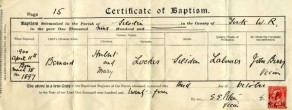
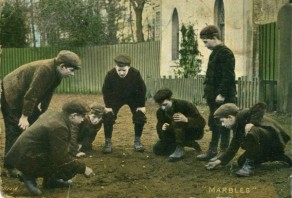
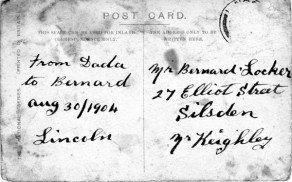
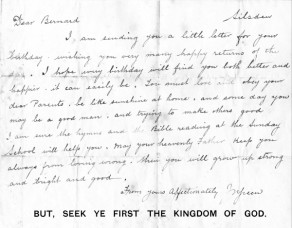
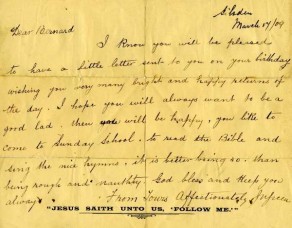
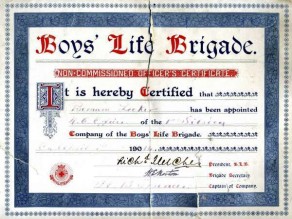
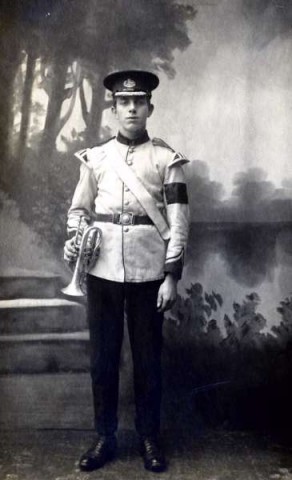
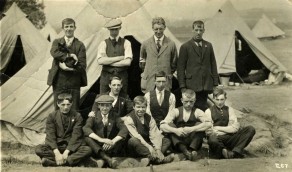
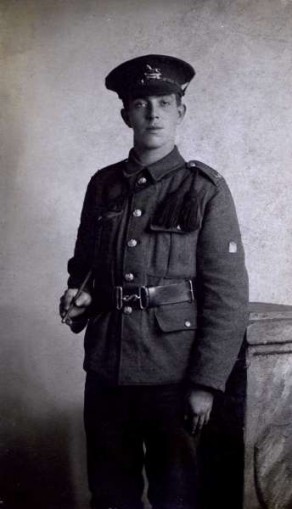
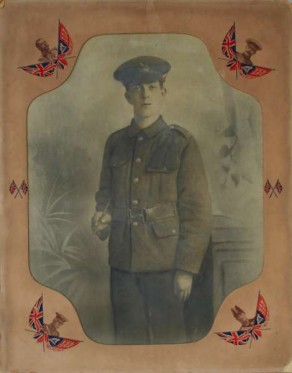
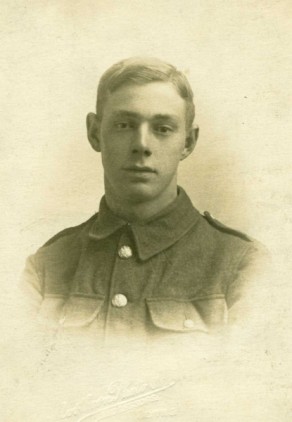
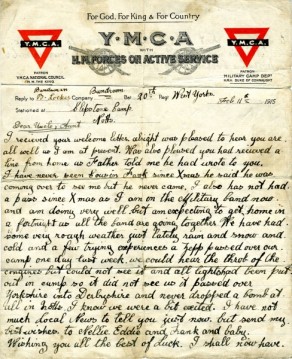
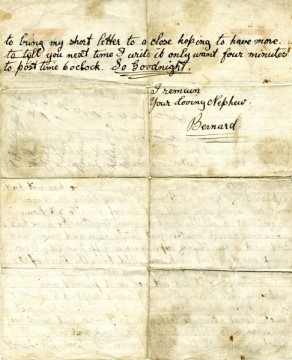
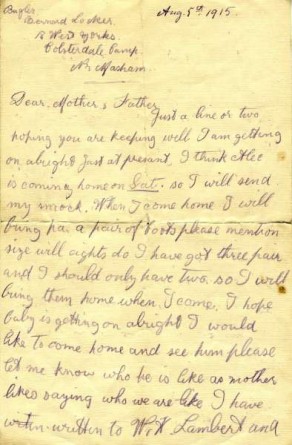
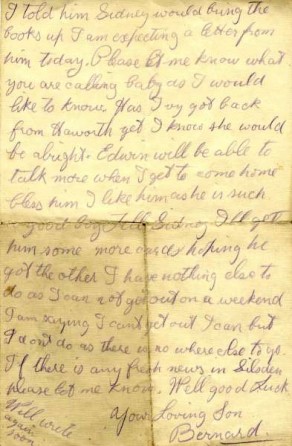
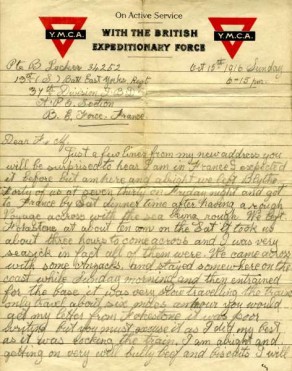
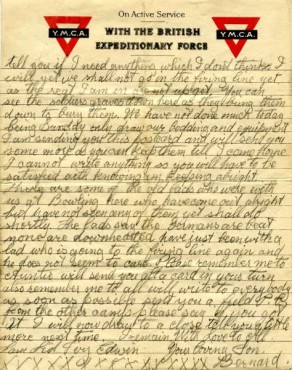
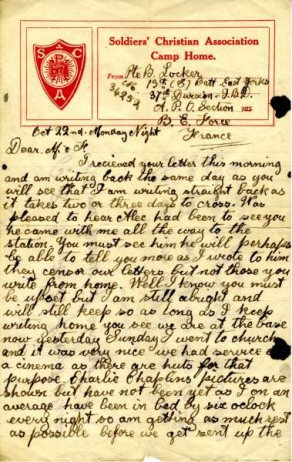
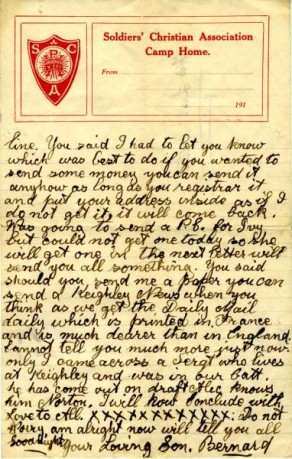
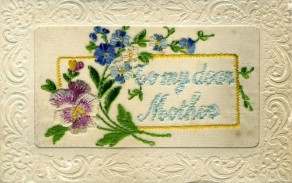
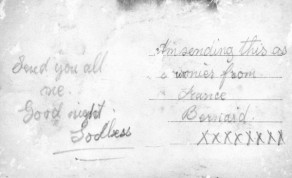
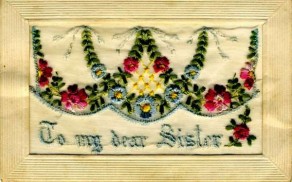
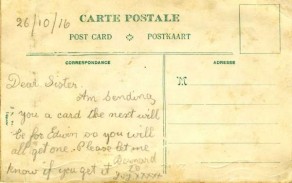
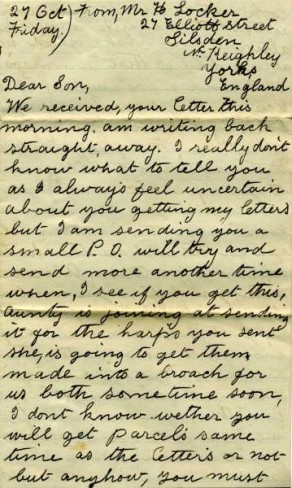
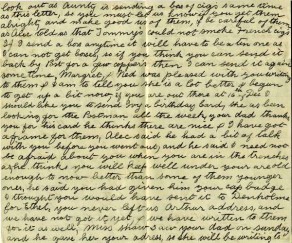
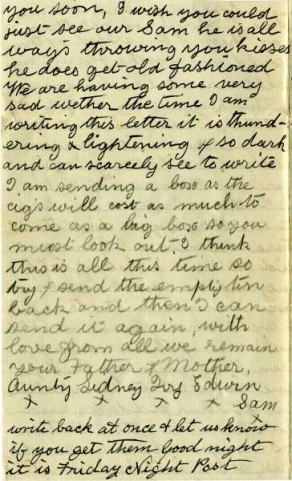
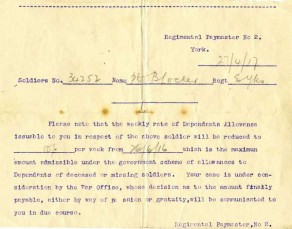
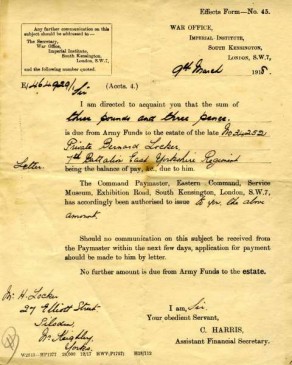
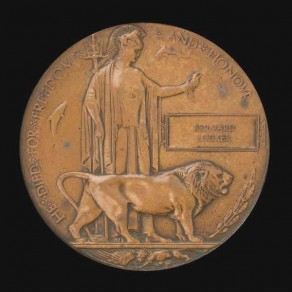
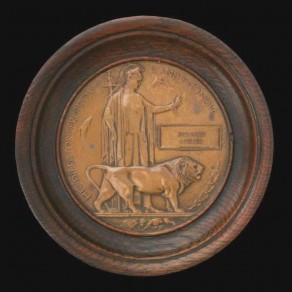
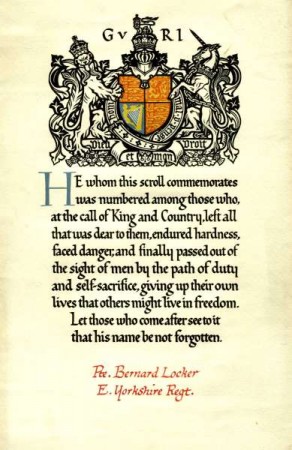
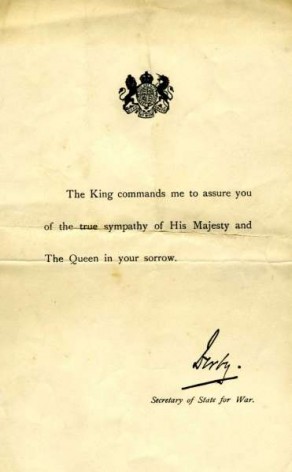
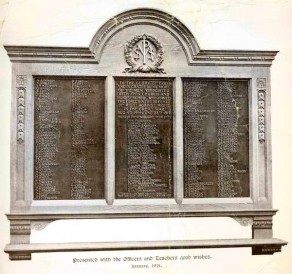
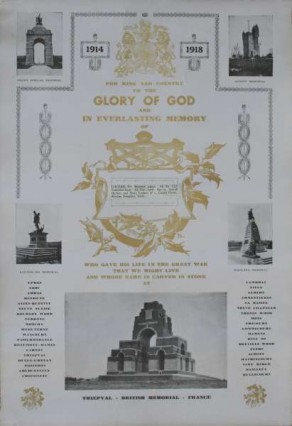
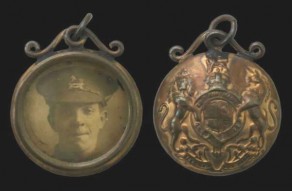



No comments yet.